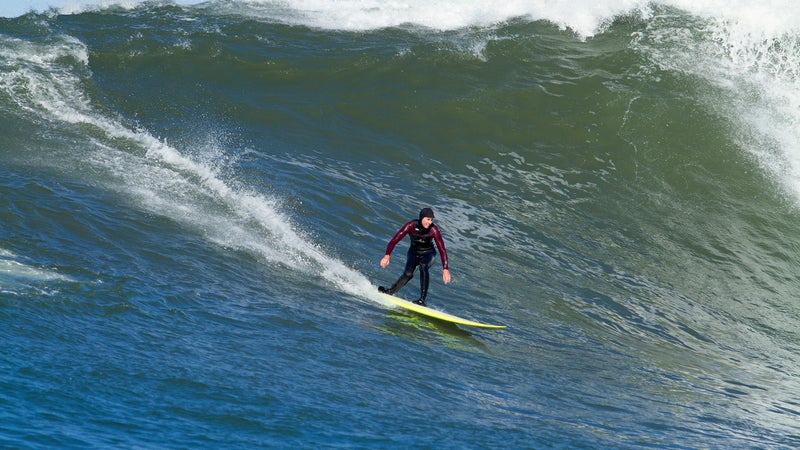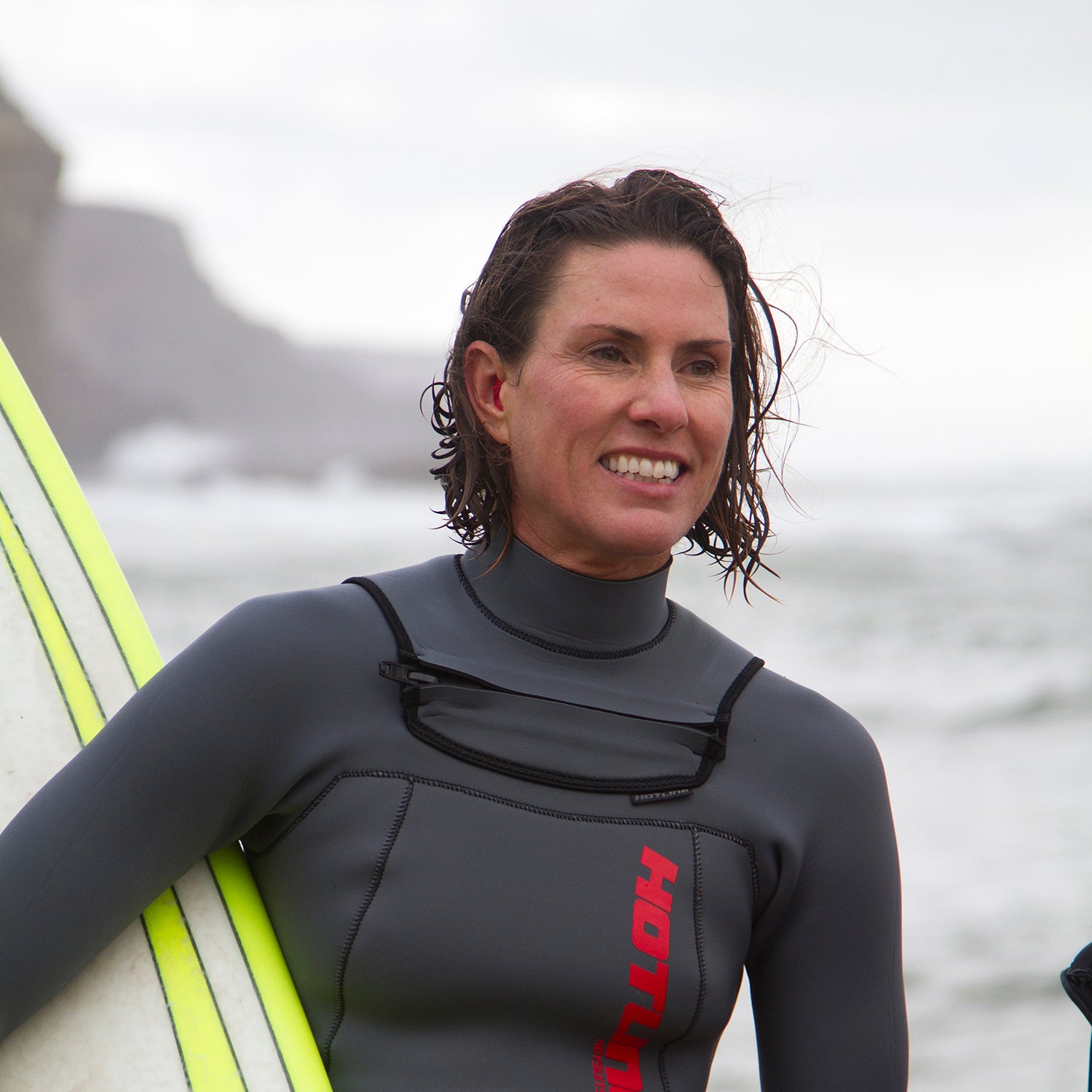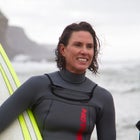Sarah Gerhardt is not a professional surfer, but among big-wave riders��she needs no introduction. In 1999,��Gerhardt��was the first woman to drop in at Mavericks, the monster break off the Northern California coast.��Just a few weeks later, Quicksilver held the inaugural surf contest there,��calling it��“Men Who Ride Mountains.”��In fact, no woman was invited��until 2016,��when the contest was forced to add a women's heat��in order to receive a permit from the California Coastal Commission.
Being a��pioneer in a male-dominated sport is never easy, but����Gerhardt��had a particularly challenging road. Growing up in San Luis Obispo, California, she and her sister cared for their mother, who suffered from severe muscular dystrophy, while their father was at sea for months at a time as a merchant marine. The family often struggled financially and she was bullied in school. But Gerhardt’s dad gave her a surfboard and wetsuit for her 13th birthday and she found refuge in the ocean.��On a trip to Hawaii in college, she fell in with a crew of surfers that included big-wave icon Ken Bradshaw, and��quickly found herself tackling bigger and bigger waves.��
Now a chemistry professor at Cabrillo College, Gerhardt continues to ride huge swells.��On a recent episode of the�����ϳԹ��� Podcast, she��spoke with correspondent Stephanie May Joyce��about her mentors, her hecklers, and what it’s like to ride mountains. Below is an edited transcript of their conversation.
OUTSIDE: Were you immediately hooked on surfing as a teenager?
SARAH GERHARDT:��I had a love-hate relationship with surfing. The equipment I was riding was terrible, so it was very difficult for me to learn and I was on my own and just kind of thrashing around in some pretty brutal conditions. Sometimes I would get really frustrated and just, “I never want to surf again,” and then I'd be back at the beach and be like, “I'm gonna try it again.” So I wasn't hooked immediately on surfing, but I was definitely immediately hooked on the ocean. I loved the way it smells on a big day. It's actually a little ozone smell, it smells kind of sweet.
Surfing was a way to be part of that experience, so I kept at it. And then eventually when I did figure out how to stand up on a wave and go down the line, the feeling was just like flying on water, and I just kept wanting that feeling over and over again.
What drew you to big-wave surfing?
There’s the social component. I did have a lot of negative energy from men. I got a lot of heckling, like “You’re a chick, you can't surf.” When I went out on to bigger and bigger waves, all those men who were naysayers were on the beach kicking dirt, and I could leave them behind.
I could leave everything on the beach. I could leave how crazy life was, I could leave poverty, I could leave illness, all my worries. Being out and in bigger surf requires so much attention and so much focus. It really kind of distills life down to its experiential essence and just for those brief moments in time—maybe an hour, or maybe ten seconds on a wave—it was just the kind of thing that kind of liberated me, so that I could go back to the beach and face life.

You surfed Mavericks for the first time in February 1999. What was it like?
I’d really gotten slapped around trying to paddle out.��I'd seen how terrifying it is. So I had open expectations of whatever's going to happen is going to happen.��I was just kind of fooling around, like, “Hey, is this where I sit? Is this where I go?” Colin Brown, who's become a lifelong friend of ours, was saying, “Actually, this is the perfect spot, and here comes a wave, and you're going to catch it.” So I spun around and caught a wave right then and I was completely blown away, it was such an incredible experience. I kicked out and said, “I want more of that.” So that's what I did—I went and got more.
The next swell that broke was in March, and my husband and I paddled out together. It was kind of big and stormy, and it wasn't crowded. There was a photographer on a cliff that I didn't notice, which is good, because I actually don't like being in front of a camera. I was able to go out and free surf, and I got some more waves that day. It was a really amazing experience.
I had a message on my phone when I got home from that session, from Surfer magazine, wanting to do an interview. I was like, “How the heck do they even know I got a wave?”
What is like to suddenly be a surfing celebrity?
I wasn't prepared for the attention. I didn't want it and didn't really know how to handle it. At the time, there was an online forum called Agroville, and a lot of people had pseudonyms, and so they could hide behind anonymity. A lot of people started ripping me apart. They were saying said I was stupid and I couldn't surf and and I was going to get worked and would I ever come back.��I read those comments��and I never read it again.
I did get positive feedback, too. A lot of people were really excited to see that a woman had surfed Mavericks. The interesting thing is even that was difficult to deal with��because I've never thought of myself as amazing. I'm just a normal human being��and I've spent a lot of time with my face just in the dirt, though��I've picked myself back up and kept going.��
Did you ever consider becoming a pro surfer?
I thought about it at the end of high school and��beginning of college, but there were very few opportunities for professional female surfers then. There were some women who were making a living on the tour, but mostly it wasn't really an option.
I got to surf with the top women in the world when I was in Hawaii. A lot of them were incredible surfers��but they didn't have any sponsors because they didn't look the part. They weren't a size two��with long blond hair and big boobs. I don't look like that, either, so there was no way I was going to get a sponsor. I saw the struggle, and it was just sad. And I had other had other aspirations anyway.
You were included as an alternate for an all-male��Mavericks competition in the early 2000s. How did you feel about that?
I was last on the list—there was��no way I was going to get in the contest.��But it was definitely a nod and recognition that I'd been out there, and I appreciated that honor. Interestingly enough, I didn't feel like I was worthy of it. I didn't feel like I could stand up in the same waves that men could and in the way that they were charging, so it felt a little awkward.
Do you feel differently now?
I think even after being out there for 20 years, it's still a man’s place. When there are 50 people in the water, and maybe there are only one or two women in the water, it doesn't feel like I belong there. I have a lot of really great friends that I just love and respect, and I'm excited to watch them surf. So on one hand I feel like this is my tribe, but on the other hand, I'm still an outsider and I think that it's probably awkward for the guys when they're all having fun, and they're carrying on with their banter, and, “Oh, here comes a woman. Okay, everybody tighten up, and start acting nicer.” I don't know that I'll ever experience a time when it's not like that.
There just aren't that many women involved in big-wave right now. I don't know how long it's going to take for that to change, but that doesn't mean that I'm going to stop going out. It just might always feel a little awkward.
Are you disappointed that the organizers have scrapped the Mavericks contest both years since��the all-women's heat was announced?��
I have mixed feelings about the contest. I've never been interested in competing against other people. I'd rather just go free surf. My heart isn't set on on the event happening, but I'm really looking forward to women��having their moment to shine at Mavericks.��And I am definitely the oldest person on the list, so I also feel like I'm ready to pass that torch onto to the next generation.
Listen to our conversation with Sarah Gerhardt on the ���ϳԹ��� Podcast.



 Listen to our podcast interview with Sarah Gerhardt
Listen to our podcast interview with Sarah Gerhardt